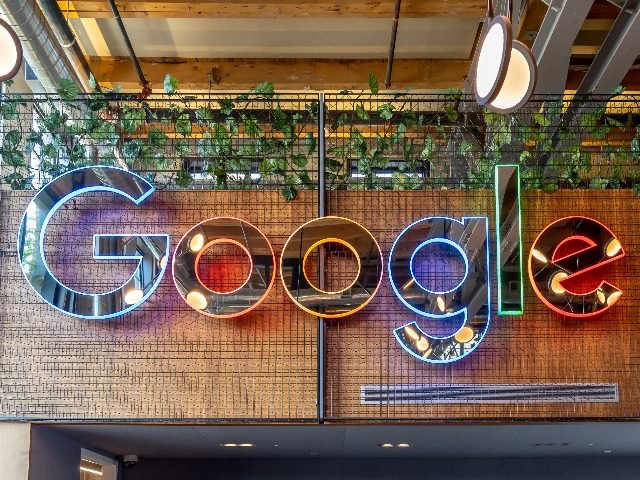The Gist
- Generative AI boosts Google. Investments in generative AI continue driving Google's robust growth in cloud services and search dominance.
- Google outpaces Microsoft. Strong performance in AI technology positions Google ahead of Microsoft in year-to-date stock gains.
- SearchGPT no threat yet. Despite the launch of new AI search tools, Google maintains a commanding lead in the global search market.
If not dead, Google was supposed to be in a tailspin by now. The rise of generative AI promised new, improved ways to seek and investigate information online. And the old keeper of blue links was meant to be on borrowed time.
Google Thrives, Surpasses Microsoft in AI
Except it hasn’t worked out that way — at least not yet. Google today is thriving. It’s turned in double-digit percentage sales growth this year and hasn’t given up its dominant lead in search. Its cloud business just hit $10 billion in quarterly revenue for the first time, partly thanks to a surge in generative AI interest. And over the past year, it’s been a better investment than Microsoft, the consensus AI leader. Google’s stock is up 37% across the past twelve months against Microsoft’s 19%, and it leads Microsoft 21% to 12% year to date.
Related Article: Google I/O 2024: AI to Redefine the Future of Search
Google Holds Steady Amid AI Surge
Google owes its stable position as much to generative AI’s slow progress as its own innovations. While OpenAI, Anthropic, Meta, and others have built more powerful AI models into their chatbots, people haven’t substituted those bots for traditional search. As of February, Bing still had less than 4% of search market share worldwide compared to Google’s 91%. ChatGPT, for context, debuted nearly two years ago.

Related Article: Google's AI Narrative Is Starting to Flip
SearchGPT Launches, Google Remains Unshaken
Last week, when OpenAI introduced its own search engine, called SearchGPT, it didn’t exactly strike fear in the halls of Mountain View.
Because “GenAI search,” as a category, simply hasn’t developed yet. The leading generative AI search engine, Perplexity, has won some loyal users, but hasn’t resonated outside that core group. As of this writing, Perplexity is No. 60 on the top charts for productivity apps in the U.S., trailing six generative AI chatbot wrappers, a bunch of VPNs and a printer app. Word from within Google is that while SearchGPT might’ve been regarded as an existential threat a few months ago, it’s unlikely to spur a reaction now. “The uber-reactive phase has passed,” one Google employee told me.
Related Article: Can OpenAI's SearchGPT Outdo Google?
Google’s Ad Business Dominates Amid AI Hype
Amid the AI hype, Google’s ad business has been a force. As advertisers’ budgets have tightened, they’ve sought clear opportunities to get a return on their spending. And Google delivers the results they’re seeking (as do Meta and Amazon). In the first quarter of this year, Google’s revenue jumped 15%, its fastest growth rate since the start of 2022. And in the second quarter, the company’s revenue rose by 14%.
“I think there is widespread misunderstanding and underestimation around how the larger and largest platforms (from Reddit to Alphabet and everyone in between) can benefit in terms of capturing budget share from marketers and reducing costs,” Brian Wieser, an analyst who writes Madison & Wall, told me.
Google Overcomes Panic, Invests Heavily in AI
Google did show some softness in YouTube revenue growth and some high spending in earnings last week, which sent Wall Street into a mini-panic, but that doesn’t negate its broader story. Embarrassing product rollouts aside, the company has yet to be meaningfully slowed down in the generative AI era.
And having survived the first punch, Google is working to ensure it’s not caught off guard again. “The risk of underinvesting is dramatically greater than the risk of overinvesting for us here,” Sundar Pichai told analysts last week. Those investments are starting to pay off. Google’s Gemini model is holding its own against leading large language models. And Google’s DeepMind unit is pushing the status quo forward, announcing a new model this week that successfully completes Math Olympiad problems, a discipline long thought of as one of the hardest for this current generation of models to conquer.
Generative AI technology, meanwhile, is boosting Google’s cloud services unit as enterprises try to unlock its value. That’s opening doors that might otherwise be shut. “Google Cloud’s AI offerings not only got enterprise customers to take another look, but spend some serious money,” Forrester analyst Lee Sustar said in April. In the second quarter of 2024, Google Cloud hit $10 billion in revenue for the first time, growing 29%.
Google Navigates AI Risks, Possibly Emerging Stronger
Of course, the generative AI moment is in its infancy and progressing fast, leaving plenty of lingering risk for Google. Meta, for instance, released a cutting-edge new Llama model this week trained on 16,000 NVIDIA h1000 GPUs, just days after Elon Musk said xAI would train a new model on 100,000 GPUs. So things are moving quickly. But so far, Google’s made it through the first generative AI wave with far less damage than anticipated. And now it may be moving forward from a position of strength.
